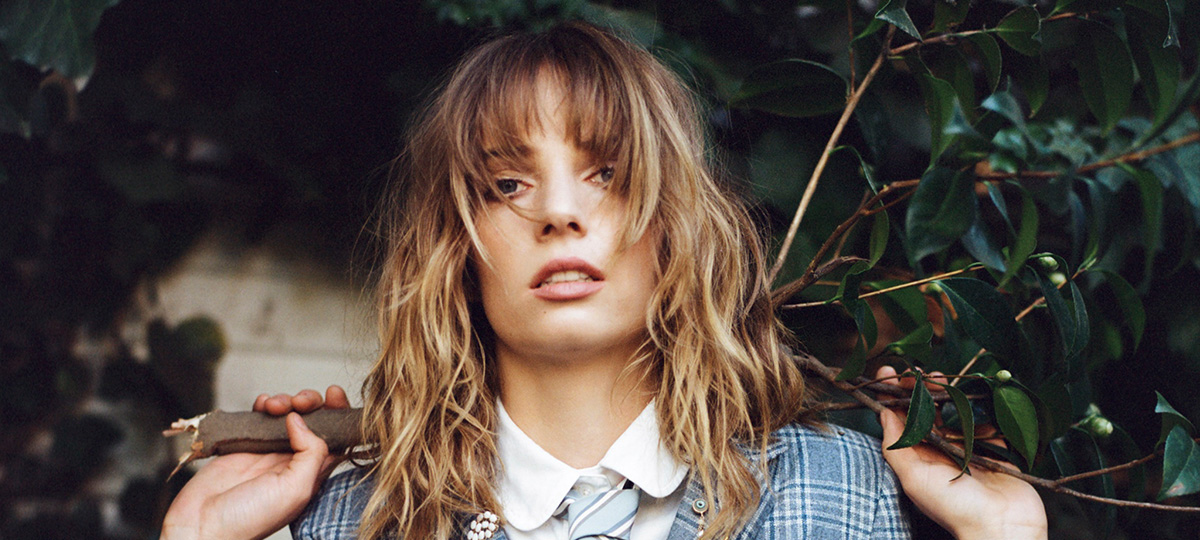
With a steely determination, Maya Hawke is holding on for dear life to a tree branch when it unexpectedly snaps and she finds herself on the ground; plaid Thom Browne stockings ripped at the knee; all nearby bystanders frozen in abject horror. But faster than anyone concerned can even ask if she's hurt, Hawke has already bounced back and is in model-mode, brandishing the broken branch as a newfound prop. Such is Hawke's head-on approach to hard work that she not only created a mood board for today's Coup De Main cover shoot at a Los Angeles haunted house, but is also directing the photographer with specific shot ideas, making the final call on outfits from the stylist's selects, pausing everything when she hears what sounds like an animal crying (FYI, just some attic raccoons hanging out), and politely but firmly asking me not to hurry the make-up artist when we are running out of daylight minutes.
"I'm independent / I am decisive," sings Hawke on the title-track of her third album, 'Chaos Angel', and I believe her. As evidenced by today, Hawke not only does her own photoshoot stunts (later, she casually mentions that she once accidentally fell through a roof during a photoshoot), she also wholeheartedly tackles everything in her professional life with the grace and self-confidence of someone who is not afraid to get her hands a little (or a lot) dirty. "It's just how I've found I can make my life more enjoyable - is to care about it more," Hawke explains, her imagination having birthed an entire 'Chaos Angel' mythology based around the titular character who learns that "you need change for love, and for change you need chaos."
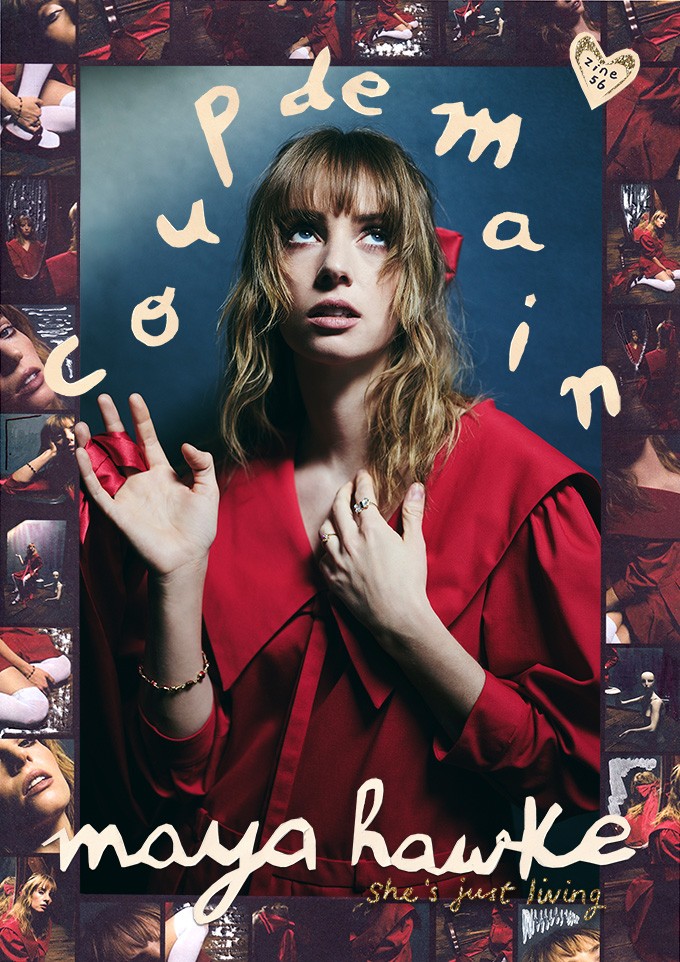 Click here to order our limited-edition CDM x Maya Hawke zines (i.e. mini-magazines featuring photos / Q&A from this cover-story).
Click here to order our limited-edition CDM x Maya Hawke zines (i.e. mini-magazines featuring photos / Q&A from this cover-story).
Charming in conversation and with a contagious enthusiasm that builds, talking to Hawke makes you feel like anything is possible - and for the daughter of acclaimed actors Uma Thurman and Ethan Hawke, that might very well be true, but it takes more than famous parents to stand up on your own. "I’ve been someone to talk about, I wanna be someone to talk to," confides Hawke wryly in the new album's lead single, 'Missing Out' - a self-aware emotional excavation that is classic of how observant Hawke is not only of herself, but also how others perceive her and her privilege. She tells me: "Whatever kind of celebrity, we all see ourselves so differently than other people see us, it's always an incredible blessing but it has aspects that are complicated - and usually, those aspects that are complicated are not interesting to anyone except your close friends and family, and that's okay."
From Robin Buckley's unrequited crushes in 'Stranger Things', to her stream-of-consciousness songwriting, and forthcoming role as Anxiety in 'Inside Out 2', tricky complications characterise Hawke's work. And on her most introspective album to date, 'Chaos Angel', Hawke weaves together her innermost thoughts into a tapestry of colourful contradictions ("I love you as much as possible / Until I want to stop"), broken promises ("Can you keep a secret without telling a lie?"), and heartfelt truths ("My anger was a compliment"). It's funny how complicated we choose to make our lives just to avoid showing how we truly feel, and Hawke understands this - 'Chaos Angel' is just as much a warm embrace for herself (literally, friends and family sing "give up, be loved" to Hawke on the stunning opening-track, 'Black Ice'), as it is for listeners.
Over 2500 years ago, the ancient Greek philosopher Heraclitus theorised that: "There is nothing permanent except change." And Hawke's album 'Chaos Angel' expounds on this, perfectly capturing what it feels like to be alive when you have a tendency to self-sabotage ("Why do it right when you can do it yourself and give up") but are also an over-achiever ("You walk wearily toward her / Cause you still have your arrow to retrieve"). Hawke's latest album contains multitudes because that is what it means to be human, and that's the true magic of Maya Hawke; scraped knees and all. Embracing vulnerability and led by her imagination, she's just living.
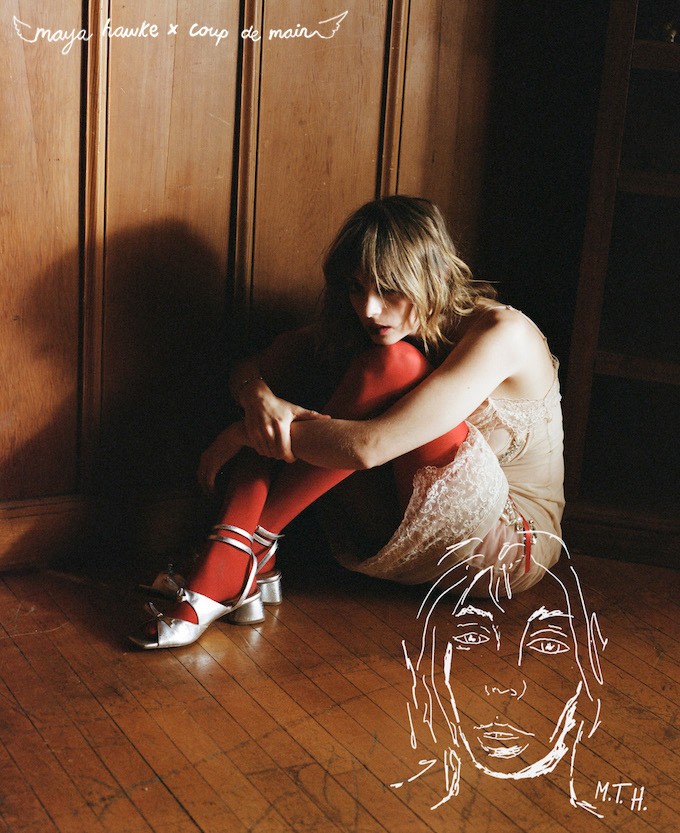 Maya wears: Simone Rocha dress, Maguire shoes, Mae Jean Vintage jewellery.
Maya wears: Simone Rocha dress, Maguire shoes, Mae Jean Vintage jewellery.
COUP DE MAIN: How mossy are you feeling today in February 2024? A year-and-a-half on from your last album, do you feel like you have finally fully untangled all the moss and now can see clearly the rock underneath?
MAYA HAWKE: Oh, what a cool question! I do feel that way. About an hour ago, I was just talking about a wave of the blues that had kind of come over me - but it feels like the difference between when you're having confusion where you're like, 'I'm upset, and I don't know why, I don't know what I want, and I don't know what to do,' versus, 'Actually, I know what I want and I know what to do.' It's just dealing with the feelings that accompany you on the journey to what you want and what you want to do. And it feels really different. Where the lack of clarity is emotional, but practically, you figured out the steps you need to take toward the life that you want to live and the kind of person that you want to be. And that's how I'm feeling right now. We'll see how long that lasts. Knock on wood.
CDM: It takes time to process - and those wintertime blues, they'll get you.
MAYA: They do get you. And also the post-release blues.
CDM: When we last spoke to you around the release of 'Moss', you said that you "feel most free when I write about imaginary characters." Do you still feel that way?
MAYA: What I've been doing lately is kind of a funny combination, where I take little parts of myself - like the way I feel one day, not the way I feel all the time. Like today, I had that bad blues an hour ago, but that's not my whole self - that's one point of view / one little creature in me that feels that way. So zeroing in on that and cutting it out away from all the other parts - the part of you that feels silly or that everything's gonna be okay - and focusing in on the singular feeling and writing from that point of view. So in a way, that's a character because it's not involving all the other parts of you that have the context to understand that feeling, it's just zeroing in on the feeling itself. And that's been feeling really, really liberating lately, that I don't always have to be my full self - I can be the petty version of me, or I can be the wise version, or I can be the romantic, or the snarky slut, or whatever. You've cut yourself up into pieces and can write from each point of view, which is all your point of view, but it's your point of view without the wisdom of the collected self.
CDM: All of a sudden, it's making so much sense to me why you were cast in 'Inside Out 2'.
MAYA: That's a great way of being - you can pick which little character in your brain, or you can write from joy or anger. I love that; that's so smart, I hadn't even thought of it, but that's a great way to describe what I'm talking about.
CDM: You can have that one for free when you do interviews for the movie.
MAYA: Thank you! <laughs>
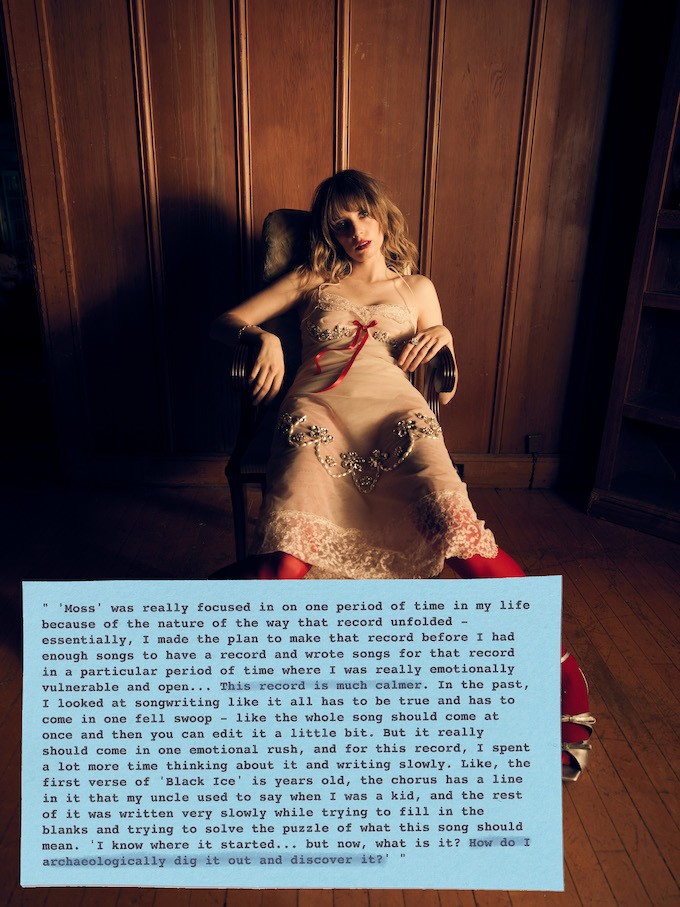
CDM: Your last album opened with 'Backup Plan', during which you sang: "I wanna be anything you've lost that you might be looking for." In contrast, this new album opens with 'Black Ice' which is about trying to find your way back home - you're now in charge of your own destiny, even if still a bit lost. This prioritising of yourself, does that reflect any changes in your own life?
MAYA: 'Moss' was really focused in on one period of time in my life because of the nature of the way that record unfolded - essentially, I made the plan to make that record before I had enough songs to have a record and wrote songs for that record in a particular period of time where I was really emotionally vulnerable and open. Focusing in on that past year-and-a-half of my life, where between both the pandemic and choices that I'd made, I really had to come face to face with who I was - and I was not necessarily happy with what I found. I wrote from the volcano that erupted in that realisation and I wrote fast and interconnected. This record is much calmer. In terms of the writing process, some of these songs were written four to six years ago, and some of them were written even after we finished the main recording of the record. I started writing 'Dark' four to six years ago, 'Hang In There' was written after we finished the record, so there's a lot of variation. In the past, I looked at songwriting like it all has to be true and has to come in one fell swoop - like the whole song should come at once and then you can edit it a little bit. But it really should come in one emotional rush, and for this record, I spent a lot more time thinking about it and writing slowly. Like, the first verse of 'Black Ice' is years old, the chorus has a line in it that my uncle used to say when I was a kid, and the rest of it was written very slowly while trying to fill in the blanks and trying to solve the puzzle of what this song should mean. 'I know where it started... but now, what is it? How do I archaeologically dig it out and discover it?' So the writing process was really different and I think the result is different in that way.
CDM: It's like an emotional excavation.
MAYA: Yeah!
CDM: The author Chuck Palahniuk once wrote (in 'Invisible Monsters') that: "Our real discoveries come from chaos, from going to the place that looks wrong and stupid and foolish." Do you agree or disagree?
MAYA: I love that! It reminds me of something David Bowie said about how when you're a creative, you always have to be in just a little bit too deep - like if your toes can touch the bottom of the sea floor, you're not really trying hard enough. But you don't want to be all the way out in the ocean where you can't feel the bottom at all. You want to be just so that your toes can't touch the bottom. So it reminds me of that, if you want to, you have to welcome in some unknowns and some vulnerability and change. Yeah, I feel that way.
CDM: Do you thrive in chaos? Do you find it comforting? Or is it stressful and a nightmare?
MAYA: I want to learn to thrive in chaos less. I think that there's a skill that some people learn, where when things get really crazy, they get really calm and they do well. Like I, for example, love the airport - I find that a very relaxing activity to go to the airport and to get on a plane because it's chaotic and stressful. But there's also a singular goal: I need to get from point A to point B, so I need to go to the airport because there's no other way to get to point B. So there's a clarity in the chaos of that experience, that I find relaxing and it settles me into a zone, and I feel that way about most chaotic experiences - that all of a sudden, the singular goal actually becomes clearer within the chaos. Where you're like: 'Wait, everyone just needs to stop fighting. Wait, we need to get...' And that's calming, versus when things are calm - sometimes I become more chaotic and I'm like, 'Oh, I need to make this look more like what makes me comfortable, I need to bring the chaos...' I'm trying to learn to do that less and less and to allow an actual calm moment, and not feel threatened by it. So, I'm working towards it.
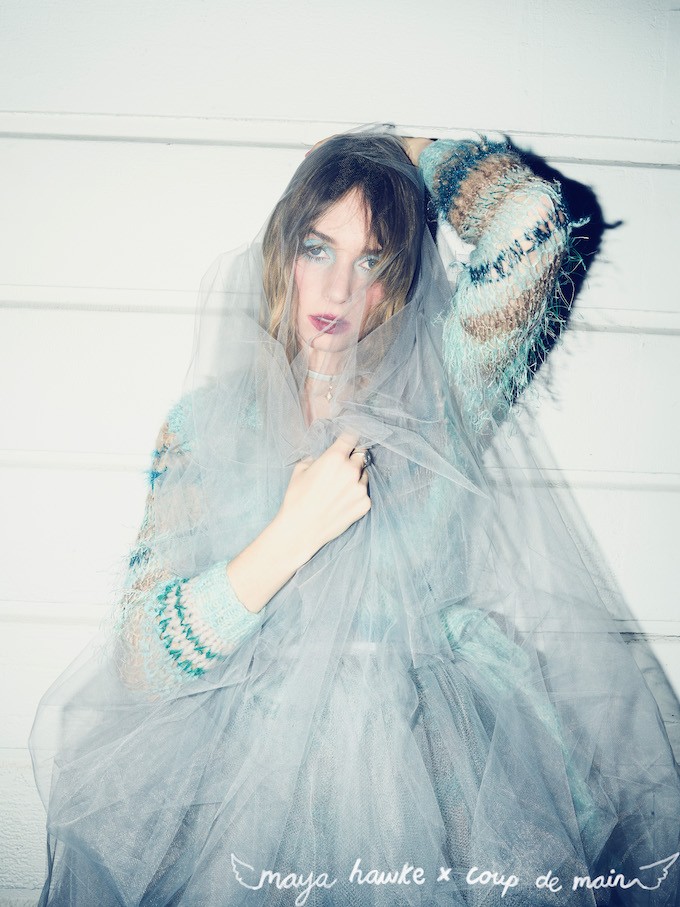 Maya wears: Rodarte full look, Maguire shoes, Almarow choker, Mae Jean Vintage jewellery.
Maya wears: Rodarte full look, Maguire shoes, Almarow choker, Mae Jean Vintage jewellery.
CDM: You've said that: "You need change for love, and for change you need chaos." Is that kind of the thesis statement for this album?
MAYA: I came up with this story of The Chaos Angel, and I'll tell it in brief because I think it will give context to that phrase, which is that in my fictitious heaven (without a religious connotation), there's a school for angels where they teach you how to be different kinds of angels - Angel of War, Angel of Love, Angel of whatever. And she was trained to be an Angel of Love. I see it as a slight allegory for how so many women are raised to believe that their primary goal in life is to find love, make love, make people happy, and make people feel good - so she was raised that way. And then she comes down to earth and it's like, 'Whoah, I can't wait to be an angel, I'm gonna be the best one ever, it's gonna be great.' At first, it starts to go well, but then the love that she's trying to create ends up totally chaotic and a mess. She's surrounded by destruction everywhere she turns, and then she runs away because she's just so ashamed of all the chaos that she's created, and gets angry: 'I'm the worst angel ever; I hate myself... Why was I even raised to be an Angel of Love? I'm the Angel of Chaos, I'm an Angel of War... Why was I told that I was an Angel of Love? This is so stupid.' So she gathered her things to go back up to heaven and tell her teachers that they were wrong to put her in the love school and that she should have been a War Angel, and to give them a piece of her mind. But as she retraces her steps, she sees that in all the places that she thought she'd made chaos, all of a sudden, beauty was growing up from the ashes of what she'd done - more beautiful than anything that had been there before. And that gets to what you said, which is that chaos is the necessary ingredient for change, and change is the necessary ingredient for love. Which makes every Chaos Angel actually an Angel of Love and vice versa. So she kind of comes to terms with being The Chaos Angel, but that chaos is love, and there's beauty in there too. So yes, I would say that is the thesis statement of the record along with kind of a secondary one about promises, which is connected to when we put ourselves in little boxes. "I promise to always love you. I promise to never be late to work. I promise to always be honest... I promise to only be The Angel of Love." They're big. It's very hard to keep ourselves in rigid boxes; you're never going to only be one thing, and you actually have to find a way to make promises that facilitate how much we all change. So what I tried to fill this record with is flexible promises. "I promise to always go through the scale of 'I want you / I love you / I'm sorry...' I promise to always give up and be loved and then give up and be loved... I'm okay, you're okay, I'm okay, you're okay... I need you / I want to be alone." We're always full of these contradictions and I tried to fill the record with those as well.
CDM: Going back to the character of the Chaos Angel, when did you first start to conceptualise her?
MAYA: While I was making 'Wildcat', this movie that I filmed in Louisville, right before I went into record this record. But I think the real answer is a little bit before then, I just didn't come up with the name for her until then. I know I was thinking about it before then because I wrote the bridge to 'Chaos Angel' (the song) before I was working on 'Wildcat'. I think I started working on it ever since I went to an exhibit at the Metropolitan Museum of Art years and years ago that was on knights and armour, and I was reading about the kingdom of the Golden Fleece. I kind of started to build a fantasy world in my head of what that kingdom was, and the characters inside of it, and I think she sort of started to surface then, but she got her name when I was working on 'Wildcat'. But I don't know, it's difficult to remember now.
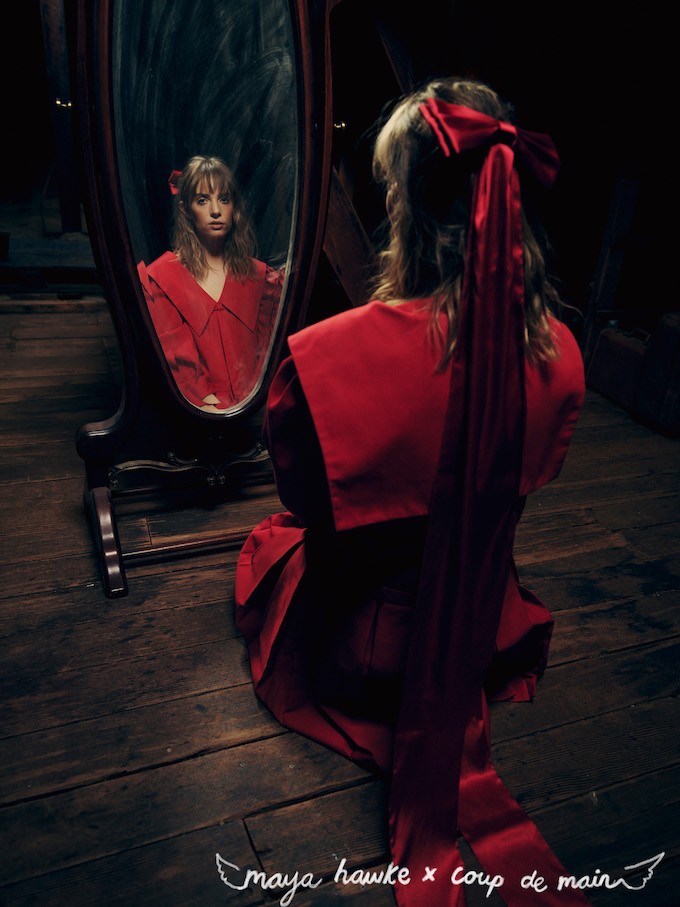 Maya wears: Sandy Liang dress + hair bow, Maguire shoes, Mae Jean Vintage bracelet.
Maya wears: Sandy Liang dress + hair bow, Maguire shoes, Mae Jean Vintage bracelet.
CDM: As you mentioned, the theme of broken promises runs throughout this album and I know that you almost decided to call the album 'Promise' instead of 'Chaos Angel'. Why did you choose 'Chaos Angel'?
MAYA: Because I thought it was a better title. I mean, that's my honest thought. And because I think I might write about promises my whole life. They really interest me. Even after making this record and exploring it so much, I don't know that I'm done exploring it. And so I wouldn't necessarily want to put a period at the end of that sentence by being like: 'This is my record about promises.' I'm not sure if I'm done, so I wanted to give it something else.
CDM: What does a promise mean to you?
MAYA: Well, like I said, what I want it to mean is something different than what it seems to mean. I think for the most part, they're quite foolish things to do. In a simple way, like if I promised to come to your party, right? 'No, you don't!' A lot of things could happen and you wouldn't come. Do you promise to try to come? And I think that's the missing word, in most promises, is "I promise to try..." Even in romantic promises, I think it really is, "I promise to try, I promise to try to see your point of view, I promise to try to get through the hard times, I promise to try..." I think that it means an intention and a commitment to that intention, but it doesn't mean anything about the finish line. And I think that's where people get confused and where I've gotten confused, is I thought that a promise painted into reality a future endpoint, and it doesn't - it just shows that you are committed to an attempt, which I think is the important part actually.
CDM: Also, words lose meaning if people don't actually mean them - like if someone says "I love you" but they don't actually mean it, or you might just tell someone very casually "I love you" and only mean it as an exclamation.
MAYA: Totally, and even romantically, I think everyone has a different meaning of that word. Some people use it very freely and go on two dates with someone, and be like, "I fucking love you," but some people will date someone for years and never say it. Everyone has a really different relationship to the word magic of different aspects of language.

CDM: On Valentine's Day, you announced this new album to fans with a postcard featuring a watercolour painting of fire-eating swans. Why did you choose that specific image to be part of the launch for this album?
MAYA: I made that painting when I was imagining a backdrop for a stage performance - I don't think I'll use it for that, but I was working on that or a back cover for the record, and I love that swans are such an interesting, powerful image. They're so beautiful and they're so violent. And so is fire. It's so beautiful and a space for creation, and it's also a tool of destruction. It's why the image of the Phoenix is so powerful to us. And so, it just kind of came into being, it was just in my head.
CDM: Having written this new album entirely, how did the creation process differ from your previous albums?
MAYA: I think we talked about that a little bit earlier - it was much more calculating, less like emotional free-fall, and more: 'What do I want to say? What do I want to make? How do I want to make it?' When we went to record, I really wanted everyone to come and stay together. I wanted it to be like theatre camp, where the whole band was staying together at this place called [The] Outlier [Inn] in Upstate New York, and we would eat together every night, and work on the music all day. I wanted everyone to feel like they had a piece of ownership over it, I wanted everyone who worked on it to write something on it, and I wanted it to feel like a team sport. Christian Lee Hutson produced it, and there were 17 songs, so we tried to do a live version of each song within the first five days of recording. And some of those we used, like 'Missing Out' for example, we used the live take or most of it, and some of them we didn't use any of, like 'Big Idea' we completely scrapped and restarted. But I wanted to get a sense of the song as a whole and not put it together piece by piece, I wanted to feel what playing it felt like - it was definitely the most intentional way I've ever made a record.
CDM: What happened to the other seven songs?
MAYA: Most of them will find a way to see the light of day. In no way were they rejected, I just felt like I had a kind of concise story I wanted to tell with this record, and they didn't fit exactly into that story and that sonic world.
CDM: Is that a promise, Maya? Have you just made a promise that you're going to release those songs?
MAYA: No! I have not! I've made a suggestion.
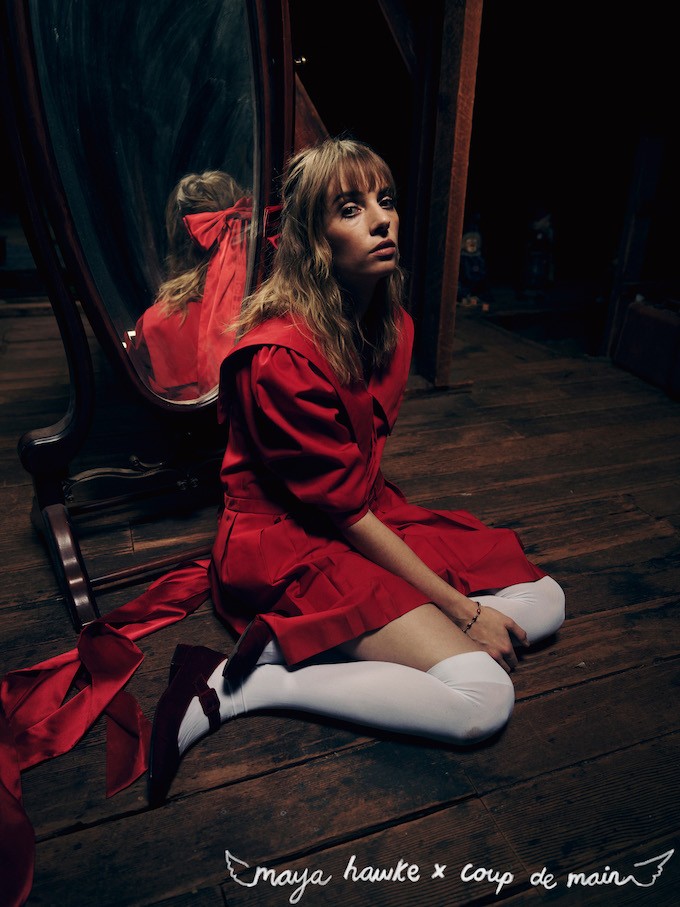
CDM: 'Black Ice' is a perfect opening song for this new album - it really sets the mood. In 'Black Ice' you're yearning for home - what does 'home' mean to you?
MAYA: It's come to mean a lot of different things. I travel a lot in my life and I've moved a lot. In the simple way: home means family, home means history, home means people you trust, home means places you feel safe. And it's a funny thing in the life of a lot of artists, that actually you spend more of your time in airports and hotel rooms than in the places that you call home. So how do I bring home with me wherever I am? Rather than striving for this imaginary idea of home that I've been sold in stories and about people's lives ("They lived happily ever after!"). When I was younger, I was craving a home base so intensely, and then I would build something that looked like one and actually feel kind of trapped there and need to escape and do something different. In the last couple of years, I started being like: 'Okay, wait, let me get out of this cycle of chaos, chaos, chaos/home, trying to build a home, picking a place, settling down, picking people, getting comfortable and then reacting negatively to that, and going back to chaos... Why don't I try to find things that are grounded and grounding and that actually fit into my lifestyle?' So right now, home is this eye mask, home is people in my life that I love and that I talk to regularly, home is getting to do the work that I love to do - and trying to allow it to be a flexible concept.
CDM: What is the audio sample in 'Black Ice'?
MAYA: The audio sample in 'Black Ice' is from a therapy session that I had as a child with three witches where they were trying to exorcise my sadness. I wanted to include in some sample from this session, which in total was over an hour, but I only have about 15 minutes of it because it was so long ago that I've kind of lost most of it, but I wanted to include it and couldn't find the right place. Then 'Black Ice' seemed like the perfect place, and I listened through it again and I found the "you become the angel in human form" even after I'd already called the record 'Chaos Angel'. I was like: 'Oh, that's exactly what's supposed to be there.'
CDM: How old were you when you had that therapy session?
MAYA: I don't know. Somewhere between seven and twelve. I can't totally remember. I mean, the facts exist somewhere, but I'm not totally sure.
CDM: That's amazing that you have the recording. I'm impressed.
MAYA: It is amazing that I was loved enough to be given a session with three witches as a sad child. And amazing that we found it. And yeah, a lot of interesting things conspired, and I've played the recording for a bunch of people and it's really interesting how people have different reactions to it. Some people are really moved by it in a positive way. And some people are really creeped out by it. It's gotten really different reactions. I don't even know how I feel about it, really, but I know it means something to me.
CDM: It's so cute that Sadie Sink contributes backing vocals to 'Black Ice'. Did you ask her to specifically come to the studio for that?
MAYA: I think she has pretty much the most beautiful voice I've ever heard in my life and I really wanted her to sing on the record. She's a very close friend of mine, and Christian had this vision of people who are important to me in my life repeating the phrase in 'Black Ice' of "give up / be loved". It's really something I'm trying to say to myself in the writing of that song: "Let yourself be loved, let yourself unwind, let yourself relax, let yourself find home." And so he thought it would be very beautiful in a kind of 'Magnolia'-esque tribute, to have people that I love and that love me come in and sing "give up / be loved". So Sadie sings it, my brother sings it, Christian sings it, Will [Graefe] sings it (who I've been playing with, for as long as I've been making music), my friend Eliza Callahan (who's an incredible musician and writer in her own right comes in and sings it), and my friend Fiona [Agger] who did the art direction on this record and who's a friend of mine since high school comes in and sings it. So it's a lot of really important people to me in my life. Sadie is one of those who came in and offered words of encouragement in this choir of friends and loved ones, and it really moves me to listen to it. I hope other people are moved by it too, but listening to the voices of all of these people that I love in a chorus telling me to relax, is a really moving and special thing that I'm really glad to have exist, even just for my own enjoyment.
CDM: You've said that the lyric "can you keep a secret without telling a lie?" is something you said to your dad when you got in trouble for lying as a kid. What was his comeback to that?
MAYA: I don't think he had one - and by used to, I just said it once. But I remembered it and he remembered it and has told it as a story to me about my childhood. But I don't think he had one. I think it was kind of a conversation ender. <laughs>
CDM: What do you mean exactly by the lyric "my anger was a compliment" in 'Dark'?
MAYA: Ooohhh! I am so glad you brought up that lyric! That one is another one that I've been holding on to for a while, it was actually the chorus of a different song that I had written kind of more around 'Moss' time and was kind of just a repeated phrase. I don't get angry a lot and that's actually an emotion that's pretty difficult for me to experience as a person. I much more quickly go to sadness or guilt or regret. Anger is really hard. And so what that means to me is: 'I got angry at you and that means I really loved you. I don't get angry easily and it means that something really important happened to me to make me feel the way that I felt.'
CDM: Are you someone who requires closure to feel like a situation is final? Or are you okay with not knowing or leaving things unsaid?
MAYA: No, I require closure to the point that I am an annoying person to deal with. I need to talk about the thing until we've talked about how we really feel about it, how we might feel about it, how we feel in our worst selves, how we feel now... I need to understand what has happened and what is happening, to the point where I think I can be kind of a pain in the ass.
CDM: What's your relationship now with your mortality, compared to when you first wrote 'Dark'?
MAYA: Whoah, with mortality? Do you get a sense of that song being about death?
CDM: Yeah, and I was reading your track-by-track where you mentioned the ENT?
MAYA: That makes sense. That was a really cool inspiration for that song - this amazing ENT, Dr. Asher, told me that I had to accept death, to get over my anxiety that I was going to die in my sleep. And I haven't felt that anxious since then; I have not felt that bad. That also was closer to the time that I wrote 'Moss' - in the darkness of that period, but I haven't felt that way since, which is a huge privilege and wonderful thing. But I'm super scared of death, in a not enlightened way, and it's definitely something I think about. It's not something that I thankfully have had that much experience with in my life, but I'm really afraid of it and I don't want it to happen. But I do feel like that song became more about metaphoric little deaths of letting certain parts of yourself go, letting certain people go, and letting certain ideas about yourself go. And like when you get a tarot card reading and you pull the death card, it generally signifies a change, not an actual death, and I think that that's what that song has come to mean.
CDM: What do you think happens when we die? Do you believe in an afterlife?
MAYA: I think it's much more interesting to... I mean, even if nothing happens, nothing is something. I don't know that I believe in nothing. My grandpa actually talks about this a lot. He calls atheists, 'The Nothing People' - the people who are obsessed with this idea of nothing and that there's nothing before you're born and there's nothing after you die and there's nothing in this space that we don't understand, but they're obsessed with nothing and they don't understand that nothing is something. There is no such thing as nothing. That's actually one of the few things we know, is that there's never nothing - there's always something in place, like even if you have a totally empty room and there's nothing in it, actually, there's air in it. And if there's no air, there's a vacuum, which is something. So I don't know what I believe in, I have no denominational beliefs, but I'm highly optimistic that there is something.
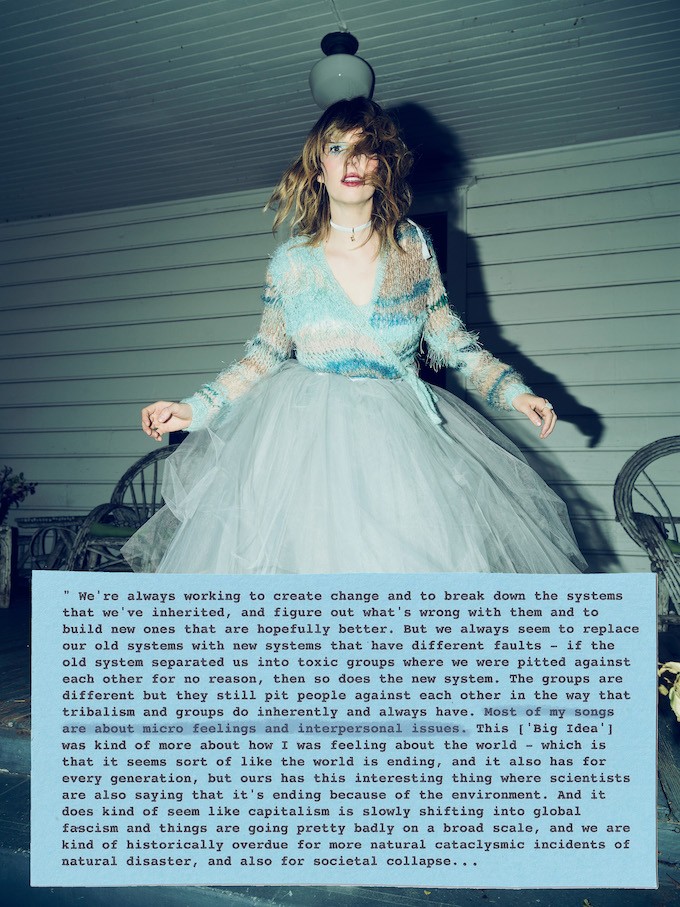
CDM: I already told you I love 'Missing Out' when we first met back in December, but I also just want to say that this line is incredible: "I’ve been someone to talk about / I wanna be someone to talk to." What was running through your mind while writing those lyrics?
MAYA: Well, in some ways, one of the first things that was running through my mind is that I had been holding on to this line, "I've bitten off way more than I can spit out," for a while. Partially because I was inspired by this song that Samia and Christian wrote together, which used to be called 'Art School', and is now called 'To Me It Was'. They were so good at turning phrases on their head and I love that the lyric in her song is "like finding a needle in a stack of needles." You think it's gonna be finding a needle in a haystack, but it's finding a needle in a stack of needles, and that was so inspiring to me when I heard that. I was like, "Oohhh, I've bitten off way more than I can spit out," which is not true. And to properly set that up, I needed to have a rhyme to run with true so that you expected to hear chew, but instead, you heard spit out and it would be surprising. So I wanted to fill in that rhyme structure, and I was feeling in my life at that time extremely lonely. I didn't have a lot of friends - I sometimes go through these cycles between being like "oh my god, I have so many friends; I have old friends and new friends and people who I never miss, and I love my life," to feeling like I have no friends and I'm all alone and nobody likes me. I don't know why I go through these different cycles - I think it has a lot to do with the frickin' phone actually - but anyway, I was in one of the down spirals of my feelings about friendships and so that came from that place of really wanting to talk to people and not be talked about.
CDM: I heard once that you need to think of friendships and any kind of relationship - business or romantic, platonic, etc - like a bank account; you have to make daily deposits in them every day or they won't grow. I think about that all the time.
MAYA: That's a great way to think about it, I love that.
CDM: Going back to what you were just saying, it's interesting how fame dehumanises people - because you're validly feeling this way, but at the same time, random people online are thinking: 'Oh, Billie Eilish just publicly named Maya Hawke as her celebrity crush, she must have a million friends and be having the time of her life.' It's weird how you stop seeing celebrities as humans because of the way that society reduces them into billboards and magazine covers.
MAYA: Yeah! Everything is a double-edged sword and it is always complicated. I've been rereading the 'His Dark Materials' series--
CDM: Such good books!
MAYA: Such good books! And in the second one, 'The Subtle Knife', he's the chosen one, and he has to lose his two fingers. Then he becomes the keeper of The Subtle Knife and he can cut between worlds - that's an amazing power and it's a huge responsibility, but it's a limitation and it makes people angry at you. And I think that having any kind of public success in the arts in America, especially where we're so obsessed with celebrity - we don't have royals and our politics have gone completely nonsense; so we're completely obsessed with celebrity - and whatever kind of celebrity, we all see ourselves so differently than other people see us, it's always an incredible blessing but it has aspects that are complicated. And usually, those aspects that are complicated are not interesting to anyone except your close friends and family, and that's okay. When you're very fortunate, it's best to talk to the closest people in your life about the other side of The Subtle Knife.
CDM: Completely unrelated to this interview, I'm so happy that you brought up those books - I love them and I think it's the most devastatingly romantic thing ever the idea of two people in different universes going to sit on the same bench every year at the same time on the same day.
MAYA: I think that is very romantic and beautiful; I agree. I love those books. I think that they contain in them SO much magic and the incredible thing about books like that is they can change the way that you look at the world. Whenever I'm reading those books, and I see a little glimmer in the air or the way the light's reflecting on dust particles, I feel like my imagination and my search for wonder in the world broaden. And that honestly gets us back to what you were asking me about faith and mortality and the afterlife. I don't know... the magic of 'The Golden Compass' might be real... dust might be real... and those things activate my imagination as much as anything else.
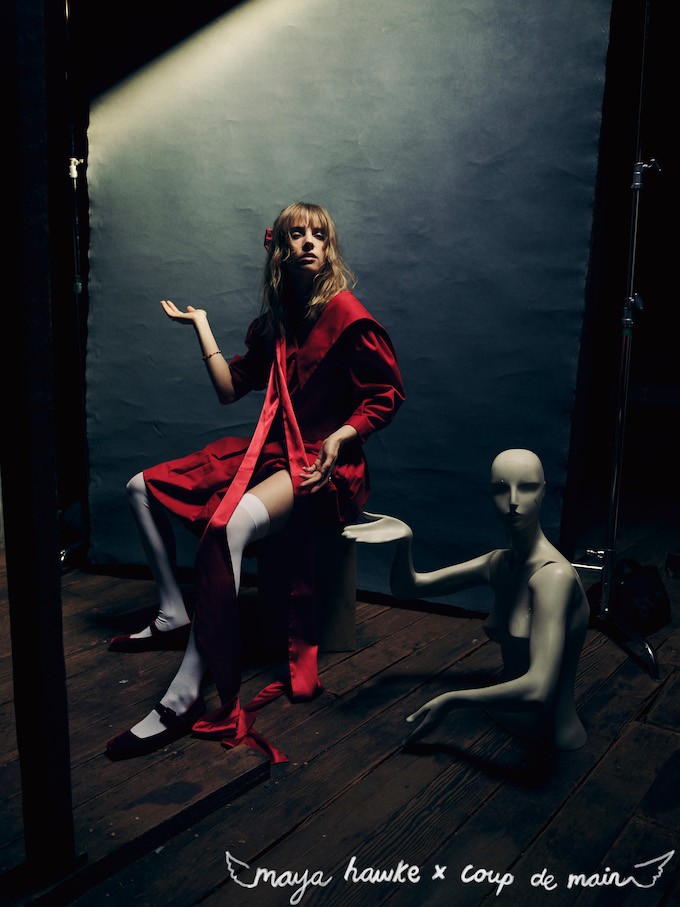
CDM: Going back to 'Missing Out'... "I buy booze for the Ivy League / With my television salary," is also great and very witty. Do you still feel any regret for having spent your college days working instead? How are you feeling about that now?
MAYA: I feel good about it right now. We're all on our own path. I've felt a lot of regret about not going to college and not taking school more seriously in my life, and I have also moved through that, but I'm sure I'll feel it again. Right now, I'm in a period of intense self-education. I'm reading a lot and learning a lot, and really enjoying that and enjoying being able to do it without the threat of grades, and that's awesome. So, I'm doing okay with it right now, but I would still recommend most people to go.
CDM: "Fire sparking up where it isn’t wanted," is what you've said 'Missing Out' is about. Is that a happy or sad feeling for you? Or just a hard feeling?
MAYA: I like that it's mysterious. In that pre-chorus, "I was left like coals in leaves," that seems kind of negative like you were thrown out with the trash kind of. But "I sparked up," seems kind of positive, but it's also catching on fire, and fire is dangerous and hot.
CDM: That's when fire-eating swans come and rescue you.
MAYA: Exactly. That's where the fire image comes from, is just that part in that song. A lot of the lyrics in that song are very direct - they're very contemporary and direct and there's kind of no two ways about what they mean. But that is the seed of mystery planted in that song and I don't really know how I want people to feel about that - I kind of want everyone to decide for themselves whether or not they think that that's a positive part of the song or a negative.
CDM: You've also said that "if you are aspiring to be good, you will be bad. You have to aspire towards a goal." What are the current long-term goals of Maya Hawke?
MAYA: Well, first of all, to clarify what I meant by that is: saying that "Lucy wants to write the next Great American novel," that idea is connected to the aspiration towards greatness, or wanting to be great/famous. You can want to be those things, but they are not real things to aspire to, versus wanting to write a novel. And that's a great place to start: wanting to write something that means something to me. So, what are my long-term goals right now? Well, one of my long-term goals is to finish this season of 'Stranger Things' with grace and gratitude, and put the love into it that it deserves. It's such an incredible fortune to be a part of something that people love and to be a part of something where I get to work with the Duffer brothers and their imagination. They've built this thing! It's like getting to be in the room making 'The Golden Compass' while it's being written with Philip Pullman... like, 'Wow, I get to be here, with the imaginative minds that came up with this world and exist in it!' And I want to give it as much love as I can, for this last season - the love that it deserves and the gratitude that it deserves from me because of how much their imagination has changed my life. That's one of my long-term goals. And I really want to do a play. I haven't done a play since drama school and I really want to, and I really want to put this record out and tour it, and hopefully have it do well enough that I get to make another one.
CDM: When do you think you'll be able to tour this album?
MAYA: Probably not for about a year.
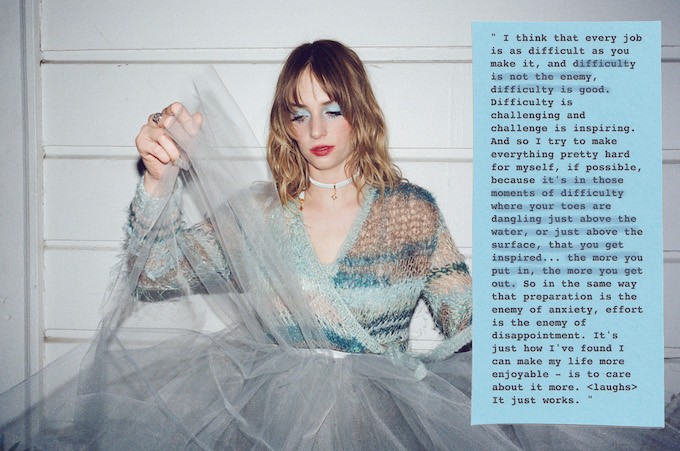
CDM: When we first met, the thing that really stood out to me was how hard-working you are. You were directing the photographer with shot ideas, directed the stylist towards your preferences, you fell from a tree branch and bounced back faster than anyone could blink let alone ask if you were okay, and when we were running out of daylight you took charge and firmly reminded me that the make-up artist needed proper time to do her job. I remember saying to your manager how much I respected you that day and she said proudly, "She's made a beautiful album, and she wants people to hear it!" Where does your work ethic come from?
MAYA: Honestly, probably my time doing school plays and going to theatre school. I remember one of my parents came to visit me when I was at theatre school on parent visiting day, and they were like: "Just so you know, this is harder than it ever is professionally." They joked to all of the students: "You're working harder than we do." And I loved that. I think that every job is as difficult as you make it, and difficulty is not the enemy, difficulty is good. Difficulty is challenging and challenge is inspiring. And so I try to make everything pretty hard for myself, if possible, because it's in those moments of difficulty where your toes are dangling just above the water, or just above the surface, that you get inspired. You can go to a photoshoot half asleep and you can put on whatever they tell you to and do whatever they say, and then you can be a little rude to people and you can leave, and that's fine. Or you can try to make it a great day for everyone, and you can try to make the pictures turn out great so that you really love them - because the magazine wants you to post them, and so you want to want to post them, and you're not gonna want to if you don't like them. So how do you make yourself like them? Well, you get really involved and you think about how you want your image to be portrayed, and you make it not a homework assignment but a creative assignment. And then you are excited to share them and you love how they turned out because you put all this love into them. And the more you put in, the more you get out. So in the same way that preparation is the enemy of anxiety, effort is the enemy of disappointment. It's just how I've found I can make my life more enjoyable - is to care about it more. <laughs> It just works.
CDM: As you say in the song 'Chaos Angel': "I’m independent / I am decisive." I always nod when I hear that bit - because yes; yes she is!
MAYA: <laughs> Thank you!
CDM: "Falling is the fastest way to make an old friend," is such a pure heartfelt sentiment in 'Wrong Again' - that you're still friends with everyone you've ever dated. What are the most important qualities for you in a friend?
MAYA: Forgiveness, forgiveness, communication. The ability to withstand space and return to each other feeling like no time has changed. And respect for the things that bring about the space, whether that's someone's relationship or their work, or sometimes friendships go through periods of distance. And I think that having respect for what creates the distance is a huge part of what having a healthy friendship is about.
CDM: You reference Allen Ginsberg's 'Howl' ("I saw the best minds of my generation destroyed by madness") at the end of 'Big Idea' with the lyrics: "I saw the best minds of my generation / Dismantle a system only to replace it." Were you writing about something specific in that moment?
MAYA: Yeah, in that moment I was writing about how we're always working to create change and to break down the systems that we've inherited, and figure out what's wrong with them and to build new ones that are hopefully better. But we always seem to replace our old systems with new systems that have different faults - if the old system separated us into toxic groups where we were pitted against each other for no reason, then so does the new system. The groups are different but they still pit people against each other in the way that tribalism and groups do inherently and always have. Most of my songs are about micro feelings and interpersonal issues. This was kind of more about how I was feeling about the world - which is that it seems sort of like the world is ending, and it also has for every generation, but ours has this interesting thing where scientists are also saying that it's ending because of the environment. And it does kind of seem like capitalism is slowly shifting into global fascism and things are going pretty badly on a broad scale, and we are kind of historically overdue for more natural cataclysmic incidents of natural disaster, and also for societal collapse. Most empires don't last this long, and we're due to end. Every generation thinks the world is ending, but it didn't end - if you were living in ancient Samaria and your civilisation crumbled, no, the world didn't end, but yours sure did. So, it actually is possible for your world to end even if THE world doesn't end. And so, trying to figure out how to exist in that liminal space of inevitable demise, and figure out how to live your life, which is kind of the classic question of: 'If you only had one day to live, how would you do it?' People usually answer one of two ways, either in utter gluttony, like basically just a pleasure seeker, which is one philosophical pathway, or trying to do as much good as possible and all of a sudden being honest with people and telling them how much you love them or whatever. It's a big question: 'Wait, so how do I want to spend this time? Do I want to spend it making love on a ballistic missile? Or do I want to spend it bringing poppy seeds to a gunfight and trying to create as much good as I possibly can in whatever way I can?' And so that's what that song is trying to be about.
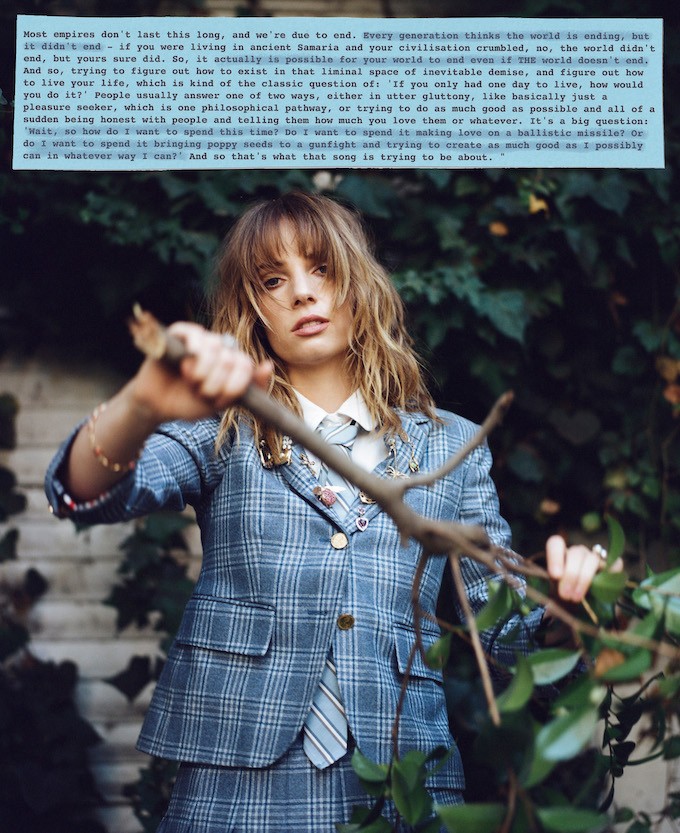 Maya wears: Thom Browne jacket/shirt/skirt/tights/shoes/tie, Mae Jean Vintage brooches and jewellery.
Maya wears: Thom Browne jacket/shirt/skirt/tights/shoes/tie, Mae Jean Vintage brooches and jewellery.
CDM: I love the imagery of "how do I get down to the bottom of your heart" in 'Okay'. If you visualise your own heart, what does it look like to you?
MAYA: Well, where that lyric comes from is I was having an argument with someone in my life and I would talk to other people about it and ask for their advice, and they would go: 'Well, at the bottom of their heart, they love you so much.' And you start to feel like: 'Okay, sure. What exactly is that going to do for me? I'm at the bottom of their heart but what do I do with that? Where is the bottom of their heart? How do I get there? Because what it feels like is that they hate me, so how do I get to the bottom then?' I don't know what's at the bottom of my heart. I think that the idea of that lyric in that song, and I don't even know if I really believe this, but it's that how people really feel doesn't really matter - how they treat each other does. I don't know if I really feel that way, but it's how I felt when I was writing that song.
CDM: I think I agree with that.
MAYA: 'You really feel like you love me? Or you really feel like you want world peace at the bottom of your heart? That's what you want? Okay, what are you doing about it?' Our actions tell us who we are and that's more important than our emotions. I really believe that - or a part of me does, and that's the part of me I was using when I wrote that song.
CDM: 'Hang In There' is really beautiful. Has the friend you wrote it about, heard the song yet?
MAYA: Yes.
CDM: What did they think?
MAYA: Honestly, I've written songs about them before, that they have not liked. <laughs> And I was very, very happy to show them this song because they did like it and it was a very positive moment in our relationship. And actually kind of a proud moment for me as a songwriter. So, they like this one.
CDM: I think the lyrics, "What happened to you, is not who you are / Everyone knows who you are," are really going to resonate with a lot of people when they hear the song. That's such a powerful sentiment and just really relatable too.
MAYA: That's so nice and makes me really happy. Especially because that's actually a lyric I was worried about being too specific, that this thing only applies to this one person, so I'm glad to hear that you think that will be meaningful.
CDM: Cillian Murphy recently said: "A lot of research as an actor is just fucking living, and having a normal life doing regular things and just being able to observe, and be in that sort of lovely flow of humanity." Do you think the same is true of songwriting?
MAYA: Yeah, observation is everything. Listening, listening... just the other day, I was listening to a podcast, and I wrote down a line from an ancient poem that was being discussed in the podcast, and it was "calm as the buttons on your shirt". And you can bet your bottom dollar you'll hear that in a song someday of mine - it's like that; paying attention. I used to have a playwriting teacher who made us bring in every week, six overheard conversations - you'd sit on the train and write down what people were talking about, paying attention to the world around you and what people are talking about, what they're feeling, what you're feeling, and what's being said. Language is palpable and powerful - someone saying it is just half the battle.
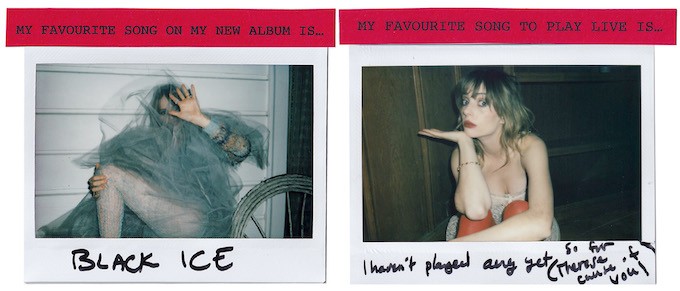
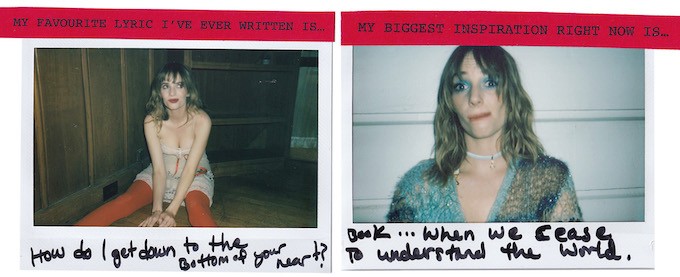
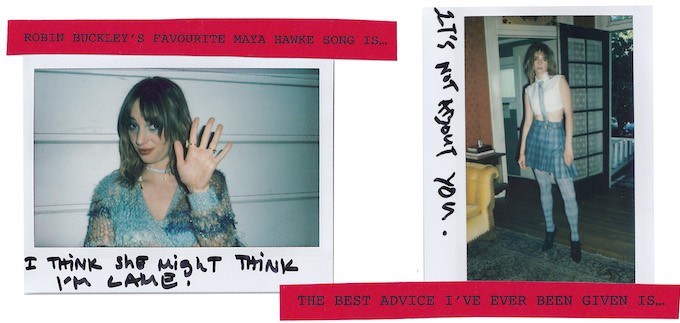
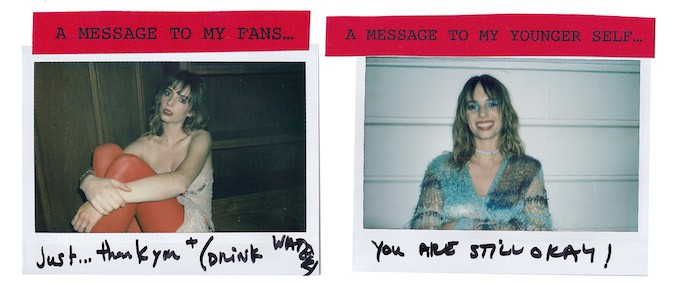
This interview has been edited and condensed for clarity.
Photos by: Daniel Prakopcyk | Styling by: Lindsey Hartman
Polaroids by: Coup De Main
Make-Up by: Jo Strettell | Hair by: Buddy Porter
Maya Hawke's new album 'Chaos Angel' is out now.
Watch the 'Missing Out' music video below...


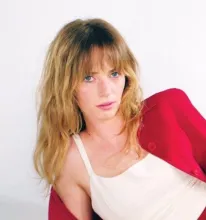 Maya Hawke
Maya Hawke